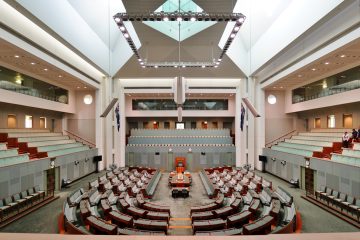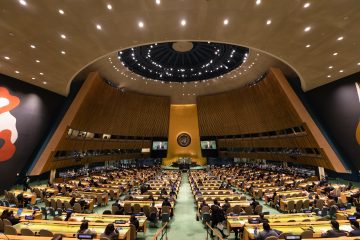
OxPol Blogcast. Politics, Re-Imagined — Democratic Backsliding with Vicente Valentim
As we witness a rise in radical right politics in Europe and beyond, our host Cassandra van Douveren speaks to Dr. Vicente Valentim, a Postdoctoral Prize Research Fellow at Nuffield College at the University of Oxford. Vicente’s work focusses on the role of social norms in normalising the expression of views and behaviours associated with authoritarianism. Join us as we discuss his upcoming book, The Normalisation of the Radical Right: A Norms Theory of Political Supply and Demand (forthcoming: September 2024), pathways to restore democratic norms and Vicente’s hopes for the future. Politics, Re-Imagined is a series by the Department of Politics and International Relations (DPIR) at the University of Oxford focused on exploring tangible and sustainable solutions to the …

Australia’s Unprecedented Coalition Politics: Unpacking Scott Morrison’s Ministerial Self-Appointments
This summer it transpired that during the pandemic previous Prime Minister (PM) of Australia, Scott Morrison, had secretly appointed himself as minister to five ministries. By the end of his mandated term in 2022, he enjoyed the statutory powers to manage six of the 14 government ministries, often unbeknownst to the already appointed ministers and the public. What makes this an especially untoward governance strategy, is that the Morrison government was a coalition government. More precisely, Morrison’s party, the Liberal party, shared government office with the National party. Two of the five ministries Morrison appointed himself to, were originally assigned to the National party. He seemingly did so for the sole purpose of influencing their governance decisions. The report of …

OxPol Blogcast. Women in Politics – Formal and Informal Politics of Women’s Representation and Activism in Latin America
OxPol Blogcast showcases research, analysis, insights, and experiences from the members of the University of Oxford’s Department of Politics and International Relations (DPIR), and specialist guests from the Oxford academic community and beyond. On this episode, we are focusing on the state of women’s descriptive and symbolic representation in party and civil society politics across Latin American countries. OxPol Blogcast host Anastasia Bektimirova welcomes three guests to bring you the stories of women’s agency at different levels of political participation in the region. The guests are sharing their expert view on the social environment, political culture, policies as well as written and unwritten rules that are shaping women’s progress and experiences in pursuing elected office, and engaging politically from civil society. With Dr. Malu Gatto, an Associate …

Bridging State Responsibility and Opportunities as African Countries Join in the Digital Silk Road
In 2015 China launched the Digital Silk Road (DSR hereafter). The DSR is an essential part of the One Belt, One Road (BRI) strategy with significant domestic and foreign policy objectives. China has made enormous investments that have allowed it to achieve rapid technological advancement and economic growth. As of 2021, Chinese firms were three of the world’s largest technology companies by revenue. According to the World Intellectual Property Organisation (WIPO), in 2020 China reported 1.5 million patent applications, 2.5 times more than the second leading country, the United States. The DSR is part of China’s plan to spread its technical and proprietary knowledge by building telecommunications, data, and financial infrastructure in countries participating in the BRI. The Nigerian digital …

Who governs? When and why governments appoint technocrats?
One of the most critical questions of modern comparative politics is: who governs? The first thing that would come to mind would be party politicians. However, transformations in several European countries’ governmental arena indicate that partisan presence in office, and, more broadly, the general model of party government, characterised by parties’ centrality in representing the needs and demands of citizens, is in decay. Such a decline owes much to the increased government involvement of technocratic personnel – i.e., ministers with no political affiliation. Indeed, while Italy established itself as the promised land of technocracy, currently led by Mario Draghi and by four technocratic prime ministers in the last two decades, technocratic ministers have also entered the last three partisan governments …

Citizens worldwide want a stronger and more democratic UN: Findings from an international survey by Oxford, LSE, and Griffith researchers
This week, political leaders from countries all over the world are gathering for their annual meeting at the United Nations (UN) in New York. Since its creation and to this day, there have been discussions about reforming the UN. Soon after the UN was founded in 1945, public figures like Albert Einstein called for a much more powerful and democratic UN. Today, leaders such as Ukrainian President Zelensky urge fundamental reforms to strengthen the UN, while NGOs like Democracy Without Borders campaign for making the UN more democratic and representative of citizens. In an international survey in six countries worldwide (Argentina, China, India, Russia, Spain, and the United States), Mathias Koenig-Archibugi (London School of Economics and Political Science), Luis Cabrera …

The Judicialization of Politics in Latin America, Anti-corruption Crusades and Their Impact on Democratic Processes: Q&A with Professor Ezequiel González-Ocantos
In the upcoming months, the OxPol Blog will be featuring Q&A sessions with faculty from the Department of Politics and International Relations to highlight their ongoing research. Over the last few weeks, the OxPol editorial team spoke with Professor Ezequiel González-Ocantos about his ongoing projects since winning the Philip Leverhulme Prize in 2018. OxPol (OP): In 2018 you were awarded the Philip Leverhulme Prize. Could you share what projects you have been working on over the last few years since winning the prize? Ezequiel González-Ocantos (EGO): Since 2018 I’ve been working on three different projects. First, together with my colleagues Sandra Botero and Daniel Brinks we curated a collection of essays that looks at new trends in the judicialization of politics in …
OxPol Blogcast Episode 7: Latin America’s Emerging Debt Crisis
Welcome to the OxPol Blogcast, a podcast where we will be sharing research, analysis, and experiences from members of the University of Oxford’s Department of Politics and International Relations. On each, episode we will talk to a guest about a piece they’ve written for the OxPol Blog. Then, we’ll discuss their larger research agenda, their insights on conducting political science, and their time at Oxford. On this episode of the OxPol BlogCast, host Chase Harrison talks to DPhil student Christoph Sponsel about Colombia’s credit rating, the Latin American debt crisis of the 1980s, and doing work at the intersection of political science and economics. Read the original blog post here: https://blog.politics.ox.ac.uk/colombian-mass-protests-foretelling-an-emerging-latin-american-debt-crisis/









